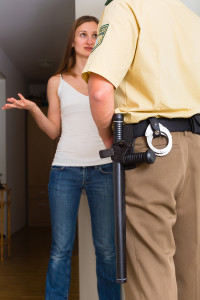 If you know anything about the criminal justice system, you know that you have the right to remain silent, and that anything you say can and will be used against you in court. If you know anything about criminal defense lawyers, you know that every last one will tell you to refuse to say a word about the incident that led up to your arrest until you have a lawyer present, and even if you’re completely innocent or the charges are minor you’re typically better off with a lawyer present than without one.
If you know anything about the criminal justice system, you know that you have the right to remain silent, and that anything you say can and will be used against you in court. If you know anything about criminal defense lawyers, you know that every last one will tell you to refuse to say a word about the incident that led up to your arrest until you have a lawyer present, and even if you’re completely innocent or the charges are minor you’re typically better off with a lawyer present than without one.
However, there are at least a few things you should say after getting arrested, and if you don’t then you really will be making things harder for yourself than they have to be.
Name And Address
If you’re arrested, the one thing you should definitely let the police know is who you are. If you don’t, you’re effectively giving the police a reason to search your person in order to find some form of identification, a search they might have had no reason to perform, and if that’s not enough then they will likely detain you until they can positively identify who you are. Giving them your name and address means fewer headaches for everyone involved.
Ask For A Phone Call
The idea that someone who is just arrested is entitled to exactly one phone call is a Hollywood myth. You’re entitled to have someone close to you know that you’ve been arrested in order to arrange bail and legal representation, but the police can place this call themselves if they decide it’s too much of a risk to bring you to a phone. On the other hand, if you are permitted to make phone calls, there’s no specific limit to how many you can make.
Don’t forget to watch what you say during your call, either. While you’re permitted to have private conversations with a lawyer, this privacy only really extends to in-person visits. Any and all calls you make, even to your lawyer, may be monitored by the police.
Refuse To Consent To Searches
Unless they serve you with a search warrant, you do not have to consent to any searches made by police officers of your person, your home, your car, or your bags. Officers can still search these things without a warrant if they have probable cause, but if they have the owner’s permission then they don’t have to explain why they had probable cause later in court. Thus, you should verbally explain that you don’t consent to any searches in order to secure your rights as much as possible.
Ask For A Lawyer
One thing you can definitely tell the police is that you won’t answer any questions until you have a lawyer present, and as such you’re allowed to make arrangements either directly or through a friend or family member to contact a criminal defense law firm or to wait for a court-appointed public defender.
After that point, what you say is up to you and your legal counsel. You might give your account of events or you might continue to remain silent, but either way it’s much safer to have a legal expert around who’s on your side than it is to try and defend yourself alone.

